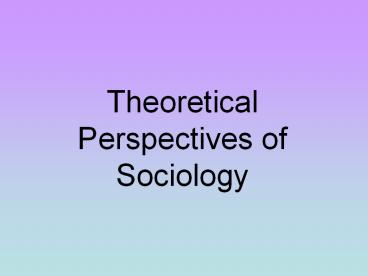Theoretical Perspectives of Sociology - PowerPoint PPT Presentation
Title:
Theoretical Perspectives of Sociology
Description:
Theoretical Perspectives of Sociology How we Influence Others SOCIOLOGICAL IMAGINATION - An awareness of the relationship between an individual and the wider society ... – PowerPoint PPT presentation
Number of Views:186
Avg rating:3.0/5.0
Title: Theoretical Perspectives of Sociology
1
Theoretical Perspectives of Sociology
2
How we Influence Others
- SOCIOLOGICAL IMAGINATION - An awareness of the
relationship between an individual and the wider
society
3
Peoples thoughts, feelings, and actions are
strongly influenced by the social interaction of
the groups to which they belong-Sociologists
concentrate on the ways that people relate to
each other and influence one anothers behaviors
4
- View ones own society as an outsider would
5
Handout The Role of Influence in Our Lives
6
Macrosociology
- Study large scale phenomena or entire
civilizations - Example prison systems, violence, marriage
7
Microsociology
- Study small groups
- Example types of families (single parent vs.
traditional), status on a sports team, teachers
expectations their effect on student performance
8
3 Theoretical Perspectives
- FUNCTIONALIST each group serves a function to
maintain societys stability - If it doesnt contribute to stability, then it
doesnt get passed down to next generation
9
- Functionalists dont make judgments of whether a
behavior is acceptable or unacceptable - Hope to explain how an aspect of society that is
so frequently attacked (like prostitution) can
manage to survive
10
- Each social group/institution serves 2 functions
- Manifest functions overt, open, stated,
conscious - Latent functions covert, hidden, unintended,
unconscious
11
Handout Manifest and Latent Functions
12
Dysfunction element or process of society that
disrupts a social system or leads to a decrease
in stability It is not always negative
13
- CONFLICT the view that our social world is
characterized by continual struggle between
competing groups - Believes social behavior is best understood in
terms of conflict or tension between competing
groups
14
- Conflict is not necessarily violent
- Conflict theorists cant accept functionalist
theory because that says the status quo is fine
15
- INTERACTIONIST generalizes about everyday forms
of social interaction in order to understand
society as a whole focus on microsociology (like
people on juries or in their jobs)
16
- See symbols as an important part of human
communication, usually non-verbal (facial
expressions, posture, gestures) - Cultures use different gestures as symbols
17
- Different ways societies portray suicide without
using words - U.S. finger at your head (shooting)
- Japan fist against stomach (stabbing)
- New Guinea hand around throat (hanging)
18
Lets look at our high school from the three
perspectives, as sociologists would































